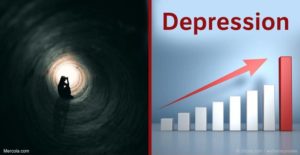 According to the World Health Organization (WHO), depression is now the leading cause of illness and disability worldwide.
According to the World Health Organization (WHO), depression is now the leading cause of illness and disability worldwide.
Depression is affecting an estimated 322 million people worldwide, including more than 16 million Americans. The rate or worldwide depression has increased by 18% between 2005 and 2015.
According to the U.S. National Institute of Mental Health, 11% of Americans over the age of 12 are on antidepressant drugs. Among women from 40-60, 25% are on antidepressants.
In addition to the individuals with depression, their families, friends and loved ones are also suffering. The global financial impact of depression is also severe. WHO estimates the global economic loss by households, employers and governments to depression is at least $1 trillion annually.
Depression is also strongly linked to an increased risk for substance abuse and diseases such as diabetes and heart disease, as well as an increased rate of suicide.
Depression Goes Unrecognized & Untreated
According to WHO, a majority of people with depression suffer in silence or do not get adequate care. In high-income countries such as the U.S., it is estimated that 50% of depressed individuals do not get treatment. In low-income countries, that percentage is closer to 80 – 90%.
Anyone who is suffering from depression should seek professional help ASAP. There are also a number of natural and non-drug relate treatments that can be discussed with any healthcare professional that is treating depression. These natural treatments should never replace professional counseling, but be done in unison and under the supervision of that healthcare professional.
In my opinion, if a healthcare professional is not willing to discuss and integrate suggested natural and effective protocols into a treatment plan, it is time to find another and more open minded healthcare professional. I also strongly advise to find another healthcare professional first, prior to dismissing the one that isn’t open minded.
12 Natural & Non-Drug Consideration to Help Depression
1. Get off junk food, processed food and sugar. Instead, eat real food, preferably organic that doesn’t have the toxic load of conventional foods. These billions of combinations of thousands of toxins, can cause biochemical imbalances in the human body that we are not even yet aware of. Organic produce is also high in natural antioxidants.
2. Get adequate sun exposure and optimize your vitamin D levels. I personally like to see vitamin D levels at about 80 nanograms per milliliter (ng/mL).
3. Get plenty of animal-based omega-3 fat docosahexaenoic acid (DHA). You can obtain DHA from krill or fish oil, but I prefer wild Alaskan salmon. Sardines, herring, anchovies and fish roe are also good sources on DHA.
4. Take your B vitamins. If you’re taking supplements, get a methylfolate form of folic acid and make sure that you are getting all of the B vitamins too.
5. Eat fermented foods and take a probiotic for gut health. The majority of the feel good hormone serotonin is produced in the gut. Serotonin levels are also increased with Prozac and Paxil, but I never heard of probiotics and fermented foods having a side effect of suicide or homicide, as you could have with those drugs. (Far Infrared has also been proven to improve serotonin levels.)
6. Use Himalayan pink salt, but consult your physician if you are on a low salt diet. Sodium deficiencies can manifest with similar symptoms as depression.
7. Make sure that your cholesterol isn’t too low, since cholesterol is important for nerve tissue maintenance and hormone production too.
8. Get on a good regular exercise program, but consult your physician first.
9. Get adequate and regular sleep in a very dark room, without blue or green light present, which interferes with melatonin production.
10. Spend more time outdoors in nature, which has a natural calming influence.
11. Try to manage your levels of stress. You can try mediation, prayer counseling or EFT or a combination of techniques.
12. Reduce your exposure to electromagnetic pollution. Grounding products and Q-Link products can help you to deal better with the EMF that you are exposed to
If you or anyone that you know are feeling desperate or have any thoughts of suicide, call the National Suicide Prevention Lifeline, a toll-free number, at 1 (800) 273-TALK (8255), or call 911, or simply go to your nearest hospital emergency department.

